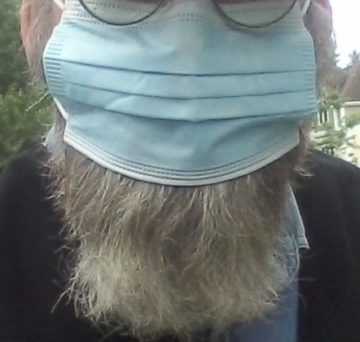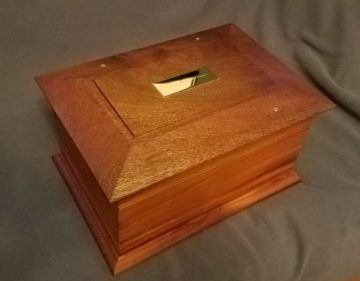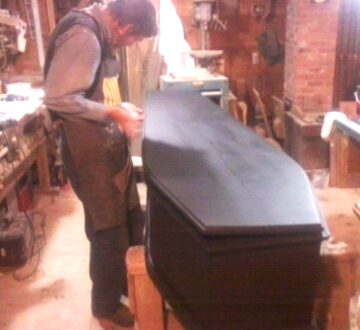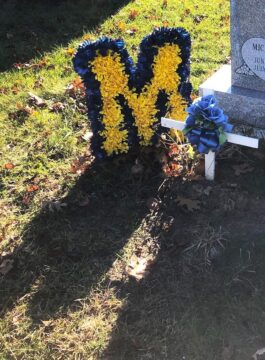by Mike Bendzela

I am a sort of “coincidence theorist”: I think most shit just happens, and our human duty is to be simultaneously appalled and amused by it all. The first gay man I ever met, who died of AIDS in 1985, was of the opposite temperament. He often told me “there are no coincidences” (his attempt, I think, to unnerve naive, Midwestern me). “The universe has a sway to it,” he used to say. He was a mystic who read Tarot cards and cast horoscopes for people, but I wanted nothing to do with any of that. Such a mindset suggests my friend must have died of AIDS “for a reason.” This view is repugnant to me, with its constant, cosmic vigilance bordering on paranoia.
The fact that the deaths I am about to describe all transpired during the covid years (2020-2022) is just that, coincidence. One of the benefits of writing nonfiction is you get to indulge the “you couldn’t make this stuff up if you tried” trope. It sometimes seems the more implausible events are, the more likely they are to be true. As Tim O’Brien puts it in his fictional accounting of the “true war story”:
In many cases a true war story cannot be believed. If you believe it, be skeptical. It’s a question of credibility. Often, the crazy stuff is true and the normal stuff isn’t, because the normal stuff is necessary to make you believe the truly incredible craziness.
At the outset of the pandemic in early 2020, people my husband and I knew suddenly began to die. Shortly after, I began to notice that I was losing my sense of smell. The first casualty, a favorite neighbor, was in his late 80s and had succumbed to a longtime struggle with cancer. I would bury his ashes that summer in the neighborhood cemetery I take care of. It was like burying a family member; I had known him for 35 years. As the pandemic was still pretty new and mysterious, those of us gathered at the cemetery stood around in the broad daylight crying behind surgical masks.
My partial anosmia took some time to confirm, but by that summer of 2020 I was seeing my doctor about it. I couldn’t give him a time of onset because I did not know when it had begun. I had previously suffered crashing sinus headaches and had undergone a CT scan, which found nothing. It’s possible that the anosmia was a consequence of a terrible head cold I suffered in November of 2019: It was the worst cold I had ever experienced–imagine a baby porcupine pulsing behind your eyeballs–and I actually cancelled my writing classes, which I never do. When I told my doctor that I could not even smell propane gas (actually the additive ethyl mercaptan), he became alarmed and sent me to an ENT (ear, nose and throat specialist), as loss of smell could be an early indicator of a cognitive disorder such as dementia. This ENT became not the only person to ask: “Have you had covid?” He examined me with a scope up my nose then scheduled me for an MRI.
The experience of getting an MRI during covid was eerie, to say the least. The little block building in South Portland, Maine seemed to have been abandoned. I had to wear a mask and just follow signs posted throughout the place. I did see another human being, but she was decked out in full personal protective gear: gown, mask, shield and gloves. “Have you experienced symptoms of covid?” she asked.
“Just loss of smell.”
I was instructed to don my own gown and sit behind a curtain until it was my time. Soon I was supine inside a machine, enduring a Techno music drone for what seemed a long time. Afterward, I got dressed and followed the signs out: “Do NOT stop at the front desk. Leave the building immediately.” I never heard back from the ENT, and after asking my doctor about it, he investigated and found that the MRI showed my sinuses were “unremarkable.”
That fall my husband’s parents died, one right after the other, each after being admitted to hospice. My husband was not surprised because, as he said, “they were bookends.” Neither parent had covid (both were in their nineties), though they had been staying at a facility that had marked several covid deaths among its residents and staff. Before his mother died, we could only visit her in hospice one at a time. I had to wait outside the building near an artificial potted plant while Don strapped a blue mask to his long, gray beard and stepped inside to see her.

Don is a retired cabinetmaker, so he was asked by his family to make the box for his mother’s ashes. He rummaged around in his shop for some mahogany wood and spent a day constructing a fine little house for her. I called it Ginny’s Mansion. It was so gorgeous it seemed a shame to have to put it in the ground.
The service in Concord, Massachusetts happened right in the middle of the pandemic. Ginny’s Mansion sat on a table before the altar in the local Catholic church. There were only immediate family members present at the service, and we all wore masks and sat spread out in the pews. The priest took off his mask only to lisp the service. Then we loaded into our vehicles and drove a few thousand feet into Sleepy Hollow Cemetery and laid Ginny to rest in her little mansion. Afterward, it being a somber but mild fall afternoon, we walked up the hill to Authors Ridge and gawked at the graves of Henry David, Ralph Waldo, Louisa May, and Nathaniel.
 Not even three weeks later, we were all back at the same church again, scattered about in the same pews, wearing identical masks, listening to the same priest lisping a eulogy, but this time for Don’s father, who had died in mid-November, following after Ginny as expected. It was weird, glancing around at each other in our masks in the church, thinking: Didn’t we just do this? Instead of the mahogany mansion, a plain pine box, painted flat black, sat on a dolly before the altar. Don Sr. had requested this modest disposition, and his son accommodated him: As his father lay dying, Don dug around in the attic of the farmhouse where we live and dusted off the pine coffin he had built for himself. It’s a truism that not everyone keeps their own coffin in the attic. Decades before, Don had made the coffin as part of a Halloween costume for a party at a neighbor’s house down the road. He dressed as Death, climbed inside the coffin, and had himself delivered to the party in the back of a pickup truck. He had planned on being buried in it himself; but not expecting to outlive his father (Don has Type 1 diabetes), he ended up refurbishing the box for his father’s interment. It just took a few coats of new paint, a new fabric liner, and a hand-made pillow to complete the kit.
Not even three weeks later, we were all back at the same church again, scattered about in the same pews, wearing identical masks, listening to the same priest lisping a eulogy, but this time for Don’s father, who had died in mid-November, following after Ginny as expected. It was weird, glancing around at each other in our masks in the church, thinking: Didn’t we just do this? Instead of the mahogany mansion, a plain pine box, painted flat black, sat on a dolly before the altar. Don Sr. had requested this modest disposition, and his son accommodated him: As his father lay dying, Don dug around in the attic of the farmhouse where we live and dusted off the pine coffin he had built for himself. It’s a truism that not everyone keeps their own coffin in the attic. Decades before, Don had made the coffin as part of a Halloween costume for a party at a neighbor’s house down the road. He dressed as Death, climbed inside the coffin, and had himself delivered to the party in the back of a pickup truck. He had planned on being buried in it himself; but not expecting to outlive his father (Don has Type 1 diabetes), he ended up refurbishing the box for his father’s interment. It just took a few coats of new paint, a new fabric liner, and a hand-made pillow to complete the kit.
It dawned on me one morning while all this was happening that I could no longer smell coffee brewing. If I held the bag up to my nose, I could just barely smell the grounds inside. Coffee still tasted fine, it just had no aroma. Then one day I was chopping garlic cloves for a spaghetti sauce, and as I tossed the garlic into the black cast iron skillet shimmering with hot olive oil–nothing happened. No pungent odor filled the air as usual. In order to smell the garlic, I had to hold my fingers up to my nose and inhale. How could a stimulus I had savored all my life suddenly be gone?
I began to pay more attention to smells. They hadn’t all evaporated. I could still smell scents around the farm–pig shit, turkey shit, chicken shit. My doctor had recommended a corticosteroid nasal spray for my sinuses, and I found I could smell the faint floral odor of the spray. Whenever a loud-ass motorcycle cruised by the house, the nasty stink of half-burned fuel and oil would assault me a few seconds later. But put a bowl of redolent Vietnamese pho in front of me–which in the past affected me as a sparkling riot of sensation–and it was like staring into a basin of hot dish water.
The epidemic persisted insanely longer than we thought it would. I took on the absurd job of teaching creative writing classes online. We never went out, but then we rarely did anyway. Then that fall we heard Don’s friend Douglas, one of his best and oldest friends, had fallen to the floor in a Chinese restaurant and died later at the hospital. Heart disease, not covid. In the spring, we all gathered in Doug’s backyard and poured his ashes around the root ball of an apple tree sitting in an open hole. Later in the year, my friend Jim, banjo player and founder of our old time jam group, succumbed to the cancer that had been plaguing him for years. We held a big tribute jam session for him in front of a laptop computer as his family watched remotely.
Standing under a hot shower one night, I picked up the pure white bar of Ivory from the soap dish and held it to my nose: it was as scentless as a stone! Please, not this, too, I thought. I loved the homey, clean baby associations of the Ivory fragrance. But it was gone. I could still smell wood smoke, though, the acrid but strangely pleasing odor of creosote burning off in the chimney.
More neighbors passed, Nancy down the road followed by her husband, David, just as Don’s parents did, but in these instances of dementia and cancer. Then, just as I was losing count of people we had lost, I got word that my own father was in the hospital. Every three weeks or so, I would drive my little Nissan pickup from Maine to Ohio and back. The first time, it was to visit Dad in the hospital. He had a rare leukemia (under control) and a kidney condition (sort of under control); he had in the past survived operations to cure him of a “false aneurysm” in his gut and a streptococcus infection in his spine; but it was the decades of cigarette smoking that brought him down. He had managed to survive with COPD for years without the aid of portable oxygen, but when his lungs finally gave out, they gave out quickly.
I knew our big, mostly lapsed Catholic family was not going to be morbid or dolorous about Dad’s decline; I have a fond memory of a nurse skipping quickly in and out of Dad’s room, singing under her breath, “Laughter is good!” But then on my last day there, I happened to enter the room just as aides were trying to stand Dad on his feet; they wanted him to try to walk; but his oxygen saturation plummeted, and the aides laid him right back in the bed.
I took his cool, bony hand into mine, leaned in and said I was driving back to Maine but would return in a week or two to see him. “I have to dig a cremation burial at the cemetery in a couple of days,” I said.
Dad opened his eyes and looked right up at me. “Be sure to leave some room for me,” he said, and feigned a long face. (I told you: you can’t make this stuff up.) My next drive back was for his funeral.
People who are hard of hearing may hallucinate noise: tinnitus. Those of us who lose olfactory function hallucinate smells: phantosmia. Our senses don’t want to take leave of us. The brain creates odors where there are none. In my case, not brewing coffee, or frying garlic, or Ivory soap, but scorched food. That is the closest approximation I can think of: The odor of something organic burning; and not smoky but scorched.

It happens off and on, not continuously. Is this how we go, one whiff at a time, until all sensations are replaced by ersatz ones?
Back in Maine after the funeral, I was in bed next to Don trying to fall asleep, when I swear I saw Dad. He had his blue-and-yellow University of Michigan stocking cap on his head. He was wearing an old gray hooded sweatshirt with his hands stuffed into the pockets. He nodded casually at me as if to acknowledge he had seen me, then he was gone.
Images by the author except where indicated.
